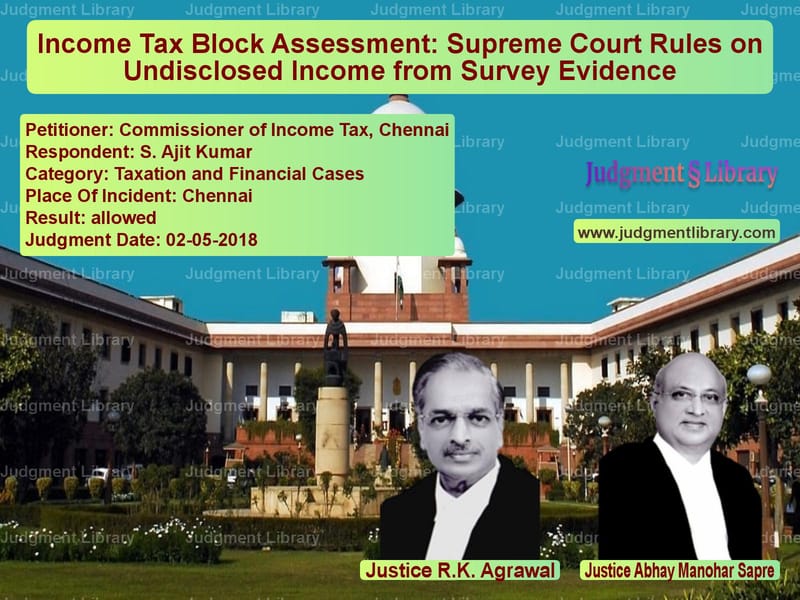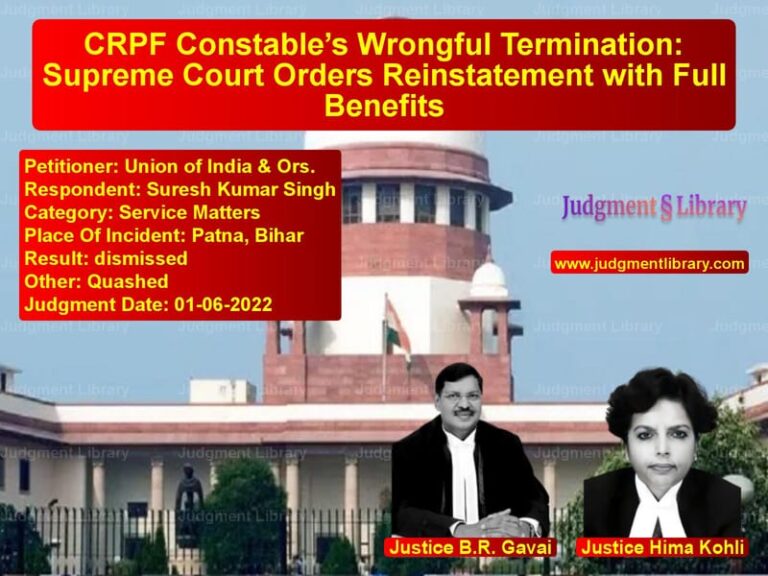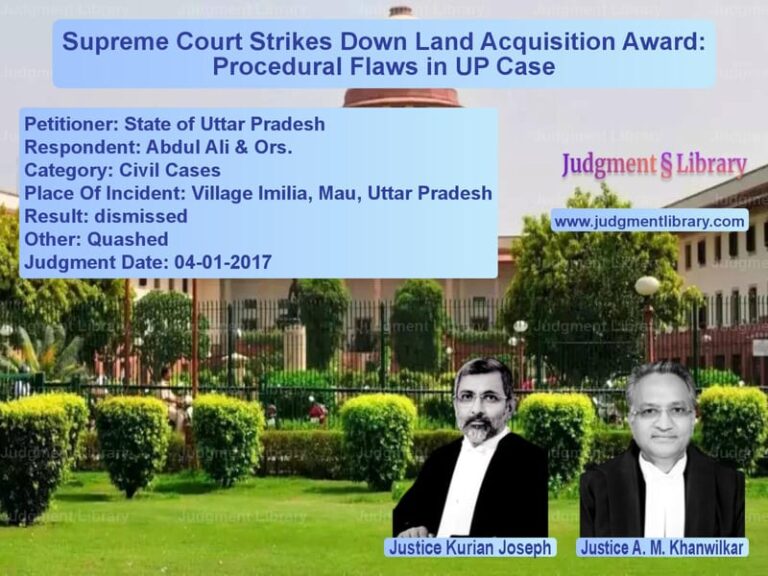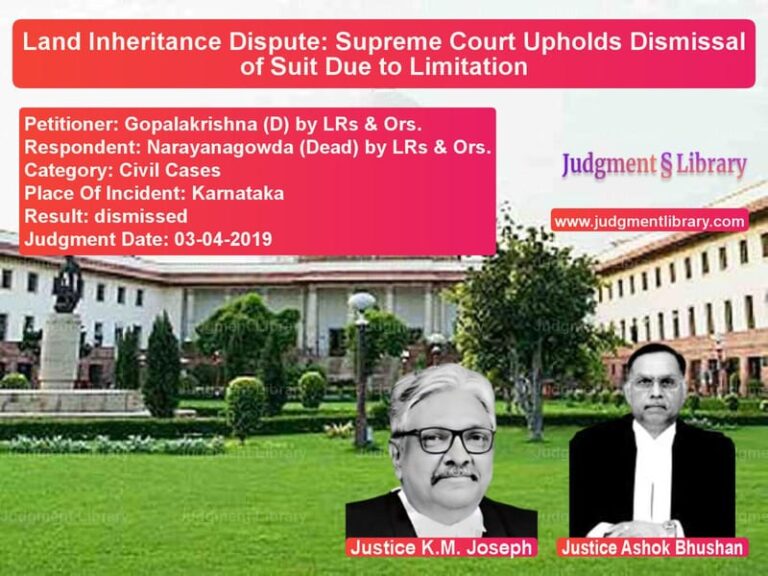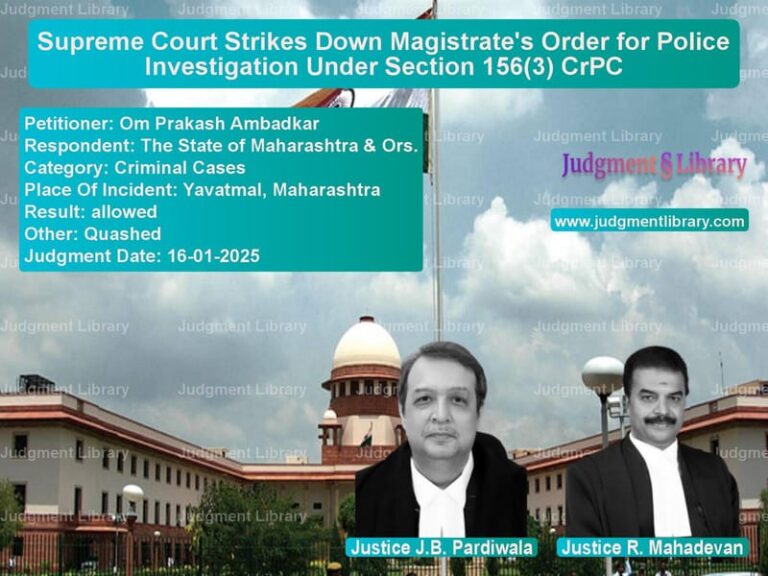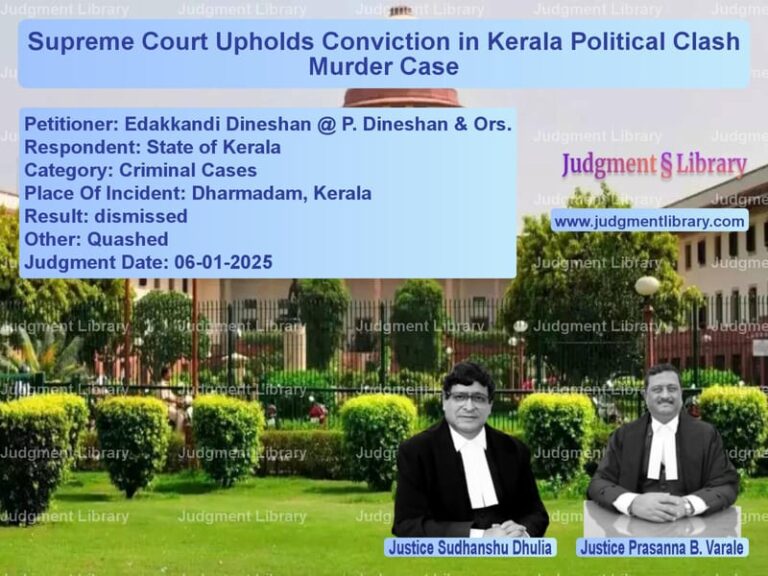Income Tax Block Assessment: Supreme Court Rules on Undisclosed Income from Survey Evidence
The case of Commissioner of Income Tax, Chennai vs. S. Ajit Kumar is a significant ruling by the Supreme Court regarding block assessments and the admissibility of evidence collected during income tax surveys. The Supreme Court was called upon to decide whether evidence gathered during a survey conducted on a third party could be used in the block assessment of an assessee.
Background of the Case
The dispute arose when the Income Tax Department conducted a search at the premises of the respondent, S. Ajit Kumar, on July 17, 2002, which concluded on August 21, 2002. Simultaneously, a survey was conducted at the premises of Elegant Constructions and Interiors Ltd. (ECIL), the builder and interior decorator engaged by the respondent for constructing his house at Valmiki Nagar. During the survey at ECIL, it was found that the respondent had paid Rs. 95,16,000/- in cash, which was not disclosed in his income tax returns.
The Assessing Officer completed the block assessment on August 31, 2004, treating the cash payment as undisclosed income. The Commissioner of Income Tax (Appeals) upheld this assessment on February 15, 2005. However, the Income Tax Appellate Tribunal (ITAT) reversed this decision on April 28, 2006, ruling that evidence from a survey could not be used in block assessments. The High Court of Madras also upheld the ITAT ruling on November 22, 2006.
Arguments by the Appellant (Income Tax Department)
The Income Tax Department, represented by the Commissioner of Income Tax, Chennai, contended:
- Evidence from a Survey is Valid: The information regarding cash payments was uncovered during a search operation, and the survey at ECIL was an extension of the same process.
- Standard Practice of Conducting Surveys: When a search is conducted at an assessee’s premises, simultaneous surveys at related businesses are common and should be treated as part of the search.
- Intentional Non-Disclosure: The respondent deliberately withheld information about cash payments, and the search operation merely confirmed this fact.
Arguments by the Respondent (S. Ajit Kumar)
The respondent, S. Ajit Kumar, argued:
- Survey Evidence Not Admissible: Information found during a survey, rather than a search, cannot be used to assess undisclosed income in block assessments.
- Legal Precedents Support Exclusion: The respondent cited multiple High Court rulings that excluded survey evidence from block assessments.
- Income Was Disclosed: The transactions related to the house construction were already disclosed in previous tax returns, except for the cash payments.
Supreme Court’s Observations
The Supreme Court, led by Justice R.K. Agrawal and Justice Abhay Manohar Sapre, analyzed the case and made the following key observations:
“It is a cardinal principle of law that in order to add any income in the block assessment, evidence of such must be found in the course of the search under Section 132 or in any proceedings simultaneously conducted in the premises of the assessee, relatives, or persons connected with the assessee.”
The Court further stated:
- Surveys conducted alongside searches should be treated as part of the search process, particularly when they involve connected businesses.
- The Assessing Officer was justified in using survey evidence in the block assessment.
- The interpretation of tax laws should not allow a taxpayer to evade liability simply because crucial evidence was collected during a survey.
Legal Precedents Cited
The Supreme Court relied on several key rulings, including:
- Assistant Commissioner of Income Tax vs. Hotel Blue Moon (2010): Established that Chapter XIV-B applies to undisclosed income detected during searches.
- Commissioner of Income Tax vs. G.K. Senniappan (2006): Interpreted the scope of survey evidence in block assessments.
- Commissioner of Income Tax vs. Bimal Auto Agency (2009): Addressed the use of external evidence in block assessments.
Final Judgment
The Supreme Court ruled:
- Evidence found during a survey that is part of a larger search operation is valid for block assessments.
- The High Court and ITAT erred in excluding the survey findings.
- The appeal by the Income Tax Department was allowed, and the Assessing Officer’s block assessment order was restored.
The Court concluded:
“In the result, all the appeals succeed and are allowed. The impugned orders are set aside and the orders passed by the Assessing Officer making the Block Assessment are restored.”
Petitioner Name: Commissioner of Income Tax, Chennai.Respondent Name: S. Ajit Kumar.Judgment By: Justice R.K. Agrawal, Justice Abhay Manohar Sapre.Place Of Incident: Chennai.Judgment Date: 02-05-2018.
Don’t miss out on the full details! Download the complete judgment in PDF format below and gain valuable insights instantly!
Download Judgment: Commissioner of Inco vs S. Ajit Kumar Supreme Court of India Judgment Dated 02-05-2018.pdf
Direct Downlaod Judgment: Direct downlaod this Judgment
See all petitions in Income Tax Disputes
See all petitions in Tax Evasion Cases
See all petitions in Banking Regulations
See all petitions in Judgment by R K Agrawal
See all petitions in Judgment by Abhay Manohar Sapre
See all petitions in allowed
See all petitions in supreme court of India judgments May 2018
See all petitions in 2018 judgments
See all posts in Taxation and Financial Cases Category
See all allowed petitions in Taxation and Financial Cases Category
See all Dismissed petitions in Taxation and Financial Cases Category
See all partially allowed petitions in Taxation and Financial Cases Category

